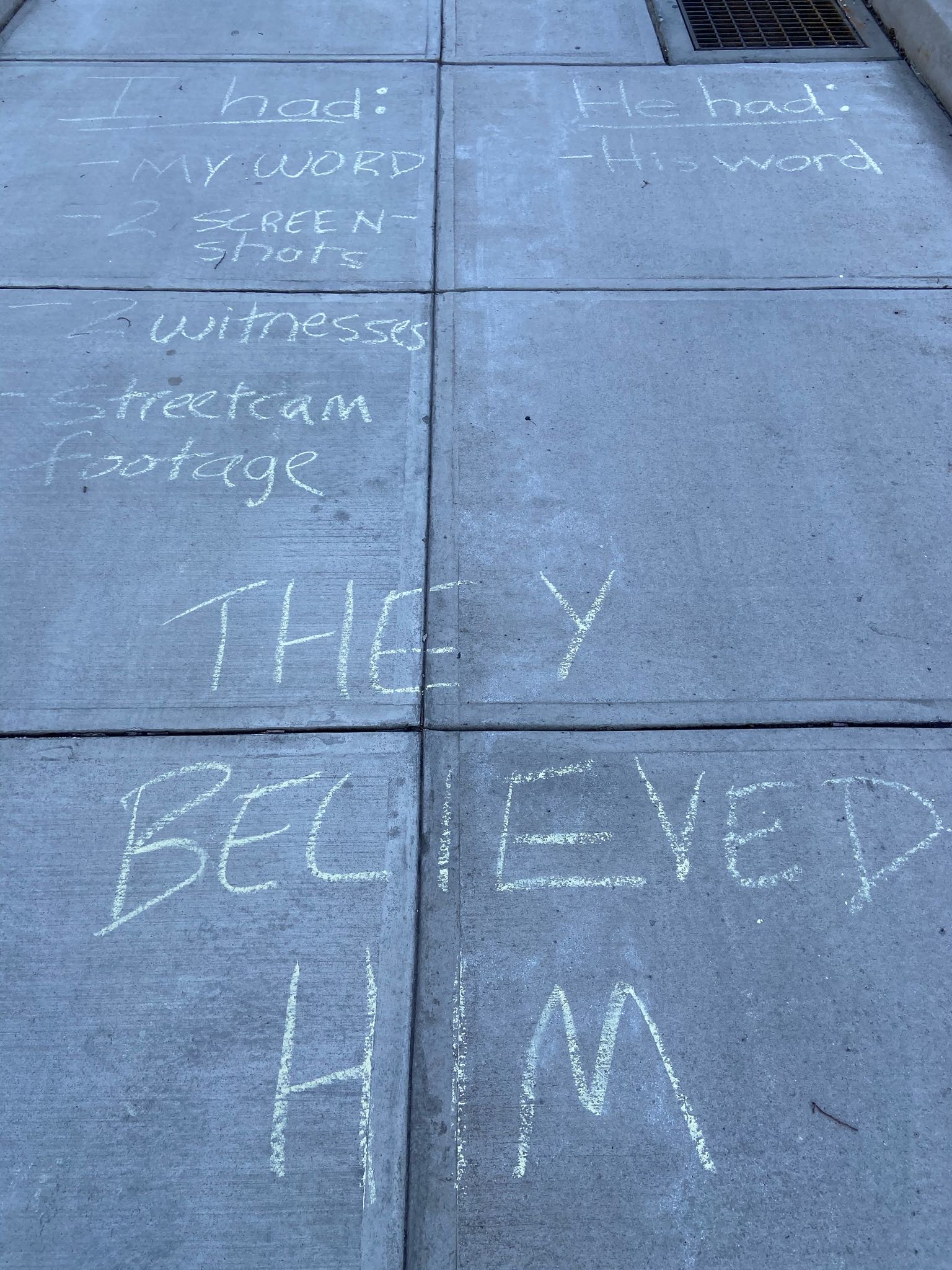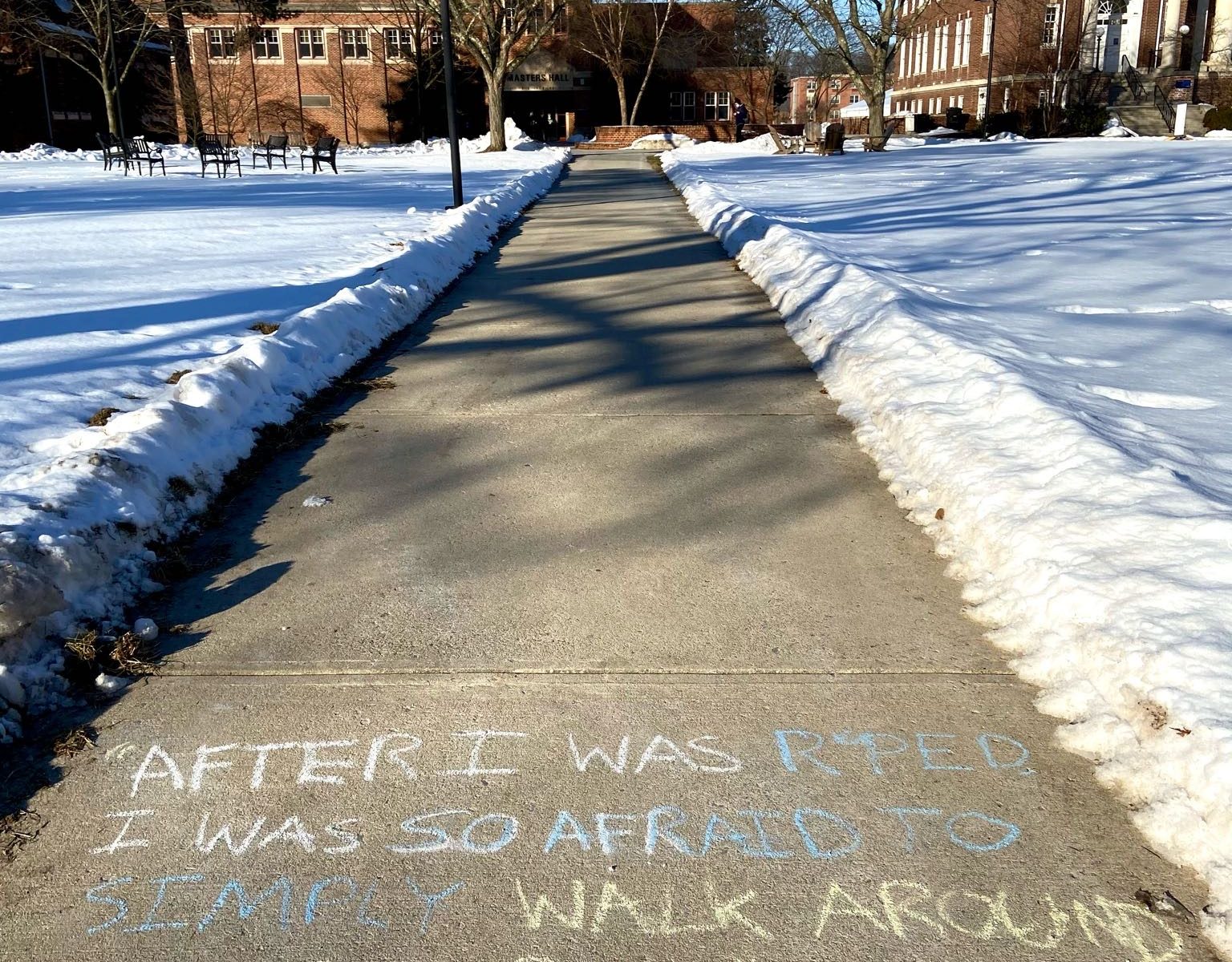
A chalk message on a sidewalk at Gettysburg College lists off a sexual assault survivor’s disappointment with their college’s handling of their case. The federal civil rights law Title IX was last amended in May 2020 by the Trump administration; the new amendments interfere with St. Thomas’s own process for dealing with Title IX-related misconduct cases and have been condemned by various groups, including the University Survivors Movement. (Courtesy of the University Survivors Movement)
The federal civil rights law Title IX was last amended in May 2020 by the Trump administration; the new amendments interfere with St. Thomas’s own process for dealing with Title IX-related misconduct cases and have been condemned by various groups, including the University Survivors Movement (USM), a group that advocates on behalf of sexual assault survivors at colleges and universities across the country.
The most recent changes are laid out in a 2,082 page document published on May 15, 2020. In response, the University of St. Thomas published a snapshot of how those changes would affect St. Thomas’s sexual misconduct policies and how the university responds to Title IX misconduct cases.
Grace Verbrugge, a coordinator of outreach and communication for the University Survivors Movement’s executive board, views the Trump administration’s document as detrimental to assault survivors.
“It was so inaccessible that people didn’t even know what the most harmful changes are. It was a garbled pile of nonsense, and that is exactly what it is crafted to be. It was meant to be so convoluted and contradictory that it slowed up the processes entirely, and deterred people from reporting (sexual assault cases) in the first place,” Verbrugge said.
St. Thomas Title IX Coordinator Danielle Hermanny explained why the university’s conclusions differed from the federal guidelines implemented last year.
“We are committed to facilitating this environment free from sexual violence, and so rules and regulations and Title IX itself is a tool for that,” Hermanny said. “For St. Thomas specifically, our mission and convictions really ground that work for us.”
USM’s policy team praised St. Thomas for working to make the ruling more accessible and providing an accurate frame of reference for what the previous guidelines were.
“I would want to know, what next? What education (is St. Thomas) going to be implementing, what does that mean for (St. Thomas’) prevention programs? I really hope there’s more coming from them that more in-depth explains what they plan to do to prevent adjudication from happening in the first place,” Verbrugge said.
USM, which remains independent from any college or university, was born from student-run Instagram accounts where sexual assault survivors from different colleges can share their experiences anonymously. Verbrugge, a junior at Gettysburg College in Pennsylvania, ran an account named Survivors of Gettysburg.
“The coalition started off as a support network because a lot of us were very new to the work,” Verbrugge said. “Just to provide reaffirmation for one another, and mental health support because running these accounts can be very taxing.”
In late September 2020, the support network established itself as the University Survivors Movement and created an executive board made up of college students from across the country. The board helps the group work on large-scale advocacy. As a part of that advocacy, the group met with the Federal Department of Education’s Office for Civil Rights on Feb. 19. They were invited by Suzanne Goldberg, President Biden’s appointee to the position of Deputy Assistant Secretary for Strategic Operations and Outreach.
“Suzanne Goldberg reached out to us and wanted to formalize a partnership. She and the rest of the team at the Office of Civil Rights scheduled the first in what will be a series of meetings with other national coalitions that are involved in this,” Verbrugge said.
USM, along with other national organizations, hopes that the Department of Education changes policies regarding sexual assault to protect students.
USM recently held protests at several colleges across the country, where students put up fliers, placed post-it notes and made chalk art drawing attention to the sexual assault problem on college campuses.
“We organize these protests with the intent to get other students involved and ask their administration, ‘if this is a problem, what are you doing about it?’ Since the protests, a number of schools have responded and ultimately, it has put organizers in the position where they are able to say clearly this is insufficient, here’s what we need,” Verbrugge said.
USM, Verbrugge, and Hermanny want students to know that they are not alone, and resources are available to them.
“The university cares deeply about this issue and supporting students and everyone. We work really hard to be responsive, to treat everyone with respect and dignity, and to provide support to those who experienced sexual misconduct, whether it’s within or beyond our community,” Hermanny said.
Along with university-level support, Verbrugge also hopes that students look after and care for each other.
“A lot of people don’t even realize that the people closest to them are survivors. I would just encourage students to really have compassion for one another, and practice that compassion,” Verbrugge said.
Owen Larson can be reached at lars6521@stthomas.edu.
Irene Shin can be reached at irene.shin@stthomas.edu.




If you are passionate about anti-sexual violence work and want to engage in the work at a local and national scale, join us! Our team is always ready to help get people involved. DM us on Instagram @weareusm or shoot us an email at info@weareusm.org